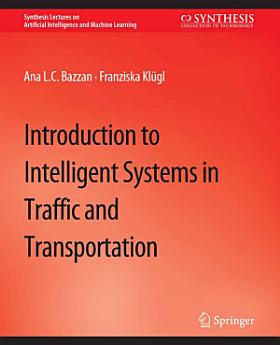Introduction to Intelligent Systems in Traffic and Transportation
Ana L.C. Bazzan · Franziska Klügl
May 2022 · Springer Nature
Ebook
119
Pages
reportRatings and reviews aren’t verified Learn More
About this ebook
Urban mobility is not only one of the pillars of modern economic systems, but also a key issue in the quest for equality of opportunity, once it can improve access to other services. Currently, however, there are a number of negative issues related to traffic, especially in mega-cities, such as economical issues (cost of opportunity caused by delays), environmental (externalities related to emissions of pollutants), and social (traffic accidents). Solutions to these issues are more and more closely tied to information and communication technology. Indeed, a search in the technical literature (using the keyword ``urban traffic" to filter out articles on data network traffic) retrieved the following number of articles (as of December 3, 2013): 9,443 (ACM Digital Library), 26,054 (Scopus), and 1,730,000 (Google Scholar). Moreover, articles listed in the ACM query relate to conferences as diverse as MobiCom, CHI, PADS, and AAMAS. This means that there is a big and diverse community of computer scientists and computer engineers who tackle research that is connected to the development of intelligent traffic and transportation systems. It is also possible to see that this community is growing, and that research projects are getting more and more interdisciplinary. To foster the cooperation among the involved communities, this book aims at giving a broad introduction into the basic but relevant concepts related to transportation systems, targeting researchers and practitioners from computer science and information technology. In addition, the second part of the book gives a panorama of some of the most exciting and newest technologies, originating in computer science and computer engineering, that are now being employed in projects related to car-to-car communication, interconnected vehicles, car navigation, platooning, crowd sensing and sensor networks, among others. This material will also be of interest to engineers and researchers from the traffic and transportation community.
About the author
Ana Bazzan received her Ph.D. in 1997 from the University of Karlsruhe, Germany. Currently, she is an associate professor at UFRGS (Computer Science Department) in Porto Alegre, Brazil. She is Associate Editor of the journals Autonomous Agents and Multiagent Systems, Advances in Complex Systems, and Journal of Multiagent and Grid Systems, and co-general chair of the AAMAS 2014 conference. Her research interests include: multiagent systems, multiagent learning, complex systems, agent-based simulation, and applications of AI and multiagent techniques in traffic simulation and control.Franziska Klugl has been a full professor in Information Technology at Orebro University, Sweden since 2011. Before that she was senior lecturer at Orebro University and assistant professor at the University of Wurzburg, Germany. She holds a Ph.D. (2000) and the Venia Legendi (2009) in Computer Science from the University of Wurzburg. Her main areas of interests are methodologies, tools, and applications of multi-agent systems, mainly in simulation. Her main application area is agent-based traffic simulation.
Rate this ebook
Tell us what you think.
Reading information
Smartphones and tablets
Install the Google Play Books app for Android and iPad/iPhone. It syncs automatically with your account and allows you to read online or offline wherever you are.
Laptops and computers
You can listen to audiobooks purchased on Google Play using your computer's web browser.
eReaders and other devices
To read on e-ink devices like Kobo eReaders, you'll need to download a file and transfer it to your device. Follow the detailed Help Center instructions to transfer the files to supported eReaders.







